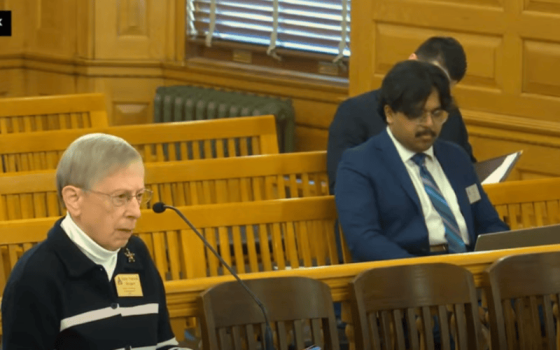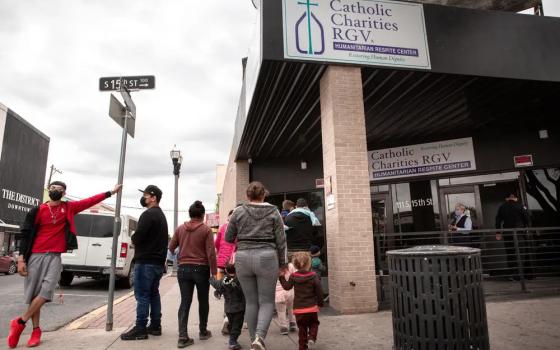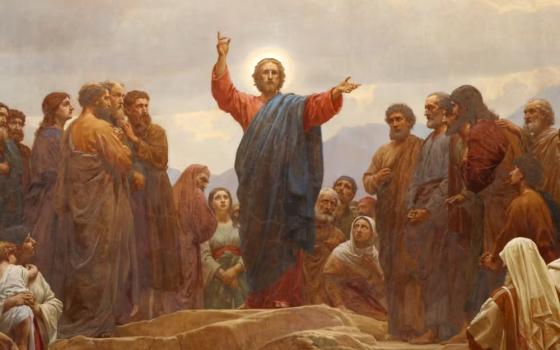WASHINGTON (CNS) -- Farmers are reporting their fruit and vegetable pickers have fled, leaving crops to rot in the field, and principals say many students have withdrawn from school as even legal U.S. residents flee Alabama after a harsh new immigration law took effect in late September.
Federal District Court Judge Sharon Lovelace Blackburn Sept. 28 lifted a temporary stay on the law, allowing most of its provisions to take effect. That includes a requirement that public schools inform the state and federal governments about which students cannot provide proof of legal residency in the U.S., and other provisions mandating that police check the papers of anyone they think might not be legal residents.
Within days, schools reported many children had stopped coming to school. Farmers said they immediately lost many of the workers they had lined up to pick their crops, even those who are U.S. citizens or who have permission to work here.
Mary Bauer, legal director of the Southern Poverty Law Center, said a hotline set up for questions about the law received nearly 2,000 calls in less than a week.
In a teleconference Oct. 6, Bauer said the situation is quickly turning into a crisis.
"Many of the calls are deeply disturbing and paint a grim picture of the aftermath of this ill-conceived law: people overwhelmed with fear; husbands who cannot take their wives to the hospital to give birth; sick people who refuse to go to the hospital to receive emergency care; thousands of terrorized children who are out of school; children who do go to school are subject to discriminatory treatment and harassment."
Bauer said one report told of Hispanic students being called out of the classroom and asked whether they were born in the United States. In some places, people who can't provide proof of legal residency are being refused water service to their homes, meaning they are cut off from plumbing facilities and drinking water, she said.
"Life as we know it has ended in Alabama -- for both immigrants and U.S. citizens alike," she said, noting that a household with a parent who lacks legal immigration status could include a spouse and children who were born in the United States or who have legal immigration status.
In the same teleconference, Fr. Jack Kane, pastor of St. Mary's Catholic Church in Opelika and director of Hispanic ministry for the Archdiocese of Mobile, said he knows of many schools that have lost many students, as their parents either are keeping them home out of fear of being harassed or the families are leaving the state.
A 1982 Supreme Court ruling held that children are entitled to public school education no matter what their immigration status. Supporters of Alabama's law, H.B. 56, say it only requires schools to report numbers, not names of students who lack immigration status.
"Everybody is suffering, and the children are suffering the most," Kane said. "It is a dark day for Alabama and for America when politicians praise a law that dehumanizes people and pushes children out of school. This unjust law not only affects unauthorized immigrants, U.S. citizen children are also bearing the brunt."
Bishop Jaime Soto of Sacramento, Calif., chairman of the U.S. bishops' Committee on Cultural Diversity in the Church, said in the same teleconference that Alabama's law is an example of states enacting measures "that in many cases are ill-conceived and will be ill-applied," in lieu of an effective national policy.
Alabama's bishops said in a Sept. 28 statement that they were pleased with part of Blackburn's ruling that blocked a provision which would have made it illegal to "conceal, transport, harbor or encourage an illegal immigrant to stay in Alabama." They said that provision would have criminalized many of the church's ministries.
Bauer said Hispanic families are scrambling to set up plans for who will care for their children in case the parents should be arrested. Others are simply leaving, which she said was the outcome hoped for by those who drafted the law.
"They said they wanted to make it impossible to live in Alabama " without legal status," Bauer said. "One said he was prepared to do everything but shoot them."
Kane said the situation is going to force some families to "live like nomads," moving from state to state because the country lacks a coherent policy on immigration.
The Associated Press reported anecdotes from farmers who were scrambling to replace workers. Farmer Lana Boatwright told AP that only eight of 48 workers she needed showed up after the law took effect. Those who came to work were so frightened of being caught out in public that she was taking them to the grocery store at night.
Alabama has an estimated 185,000 Hispanics.
The U.S. Department of Justice has challenged the law, as have various civil rights organizations.
Bauer said the case was being put before the 11th U.S. Circuit Court of Appeals and expedited review was being sought.



